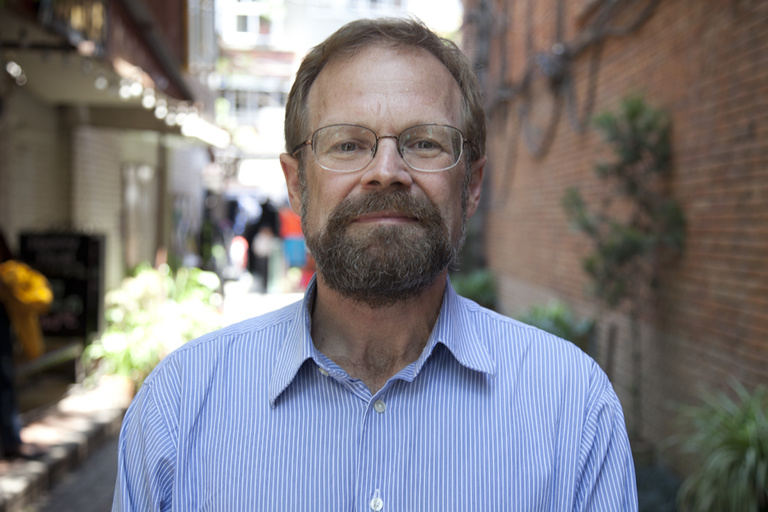
Christopher Merrill in Balkh, Afghanistan
The University of Iowa is excited to announce that Christopher Merrill, professor and director of the International Writing Program (IWP), has been selected for a Fulbright Specialist Award in Poland for 2022. This year marks the 75th anniversary of the Fulbright Program, which has given more than 400,000 participants the opportunity to study, teach, conduct research, and contribute to finding solutions to shared international concerns.
Merrill will be a Writer-in-Residence at Adam Mickiewicz University in Poznań, working with students and faculty in the art of writing MA degree program. He will lecture on American literature, creative writing, and his experiences in directing the IWP.
Merrill is one of over 400 U.S. faculty and professionals who will travel abroad this year through the Fulbright Specialist Program. The Fulbright Specialist Program, created in 2000 to complement the traditional Fulbright Scholar Program, provides short-term academic opportunities (two to six weeks) to prominent U.S. faculty and professionals to support curricular and faculty development and institutional planning at post-secondary academic institutions around the world.
As it happens, the seeds for this project were planted by an alumnus of the IWP, Piotr Śliwiński (IWP '01). Śliwiński, an assistant professor of Polish philology at Adam Mickiewicz University, co-founded the art of writing program. The program was inspired by his experience here at the Writing University.
"When [Piotr] reached out to me several months ago to see if I would be willing to come and share what I have learned along the way I accepted immediately because this work is so dear to my heart," said Merrill.
This marks the second time Merrill has been awarded a Fulbright Specialist project.
"The first project took place three years ago in Russia, at Tolstoy’s country house, Yasnaya Polyana, in Tula, and at Moscow State University," said Merrill. "I gave lectures and readings, conducted creative writing workshops, and visited literary shrines, like Boris Pasternak’s dacha and Mikhail Bulgakov’s flat."

Merrill in Kathmandu as part of a literary tour sponsored by the International Writing Program
"What is more exciting than leading what my late mentor, Brewster Ghiselin, liked to call the life of discovery? Any engagement in the creative process is illuminating, and I look forward to learning what this means to my counterparts in Poland, a country which in the last century produced three of the greatest poets in world literature—Czeslaw Milosz, Zbigniew Herbert, and Wislawa Szymborska."
Merrill hopes to bring back to campus new ways to think about writing poetry and prose, new insights into the political situation in Poland, and the creation of new friendships.
"What is more exciting than leading what my late mentor, Brewster Ghiselin, liked to call the life of discovery?," asked Merrill. "Any engagement in the creative process is illuminating, and I look forward to learning what this means to my counterparts in Poland, a country which in the last century produced three of the greatest poets in world literature—Czeslaw Milosz, Zbigniew Herbert, and Wislawa Szymborska."
To his fellow colleagues who might be considering applying for a Fulbright in their own disciplines, Merrill offers the following encouragement.
"Go for it. What better way to learn than to spend time in a new part of the world?"
Learn more about the UI resources for applying to the Fulbright Program
University faculty members at all stages of their careers can apply to become Fulbright Scholars and Fulbright Specialists. Grant recipients can teach, do research abroad, or a combination of both for flexible time periods ranging from 2-6 weeks to a semester or an entire academic year.
The Fulbright Program is the flagship international educational exchange program sponsored by the U.S. government and is designed to forge lasting connections between the people of the United States and the people of other countries, counter misunderstandings, and help people and nations work together toward common goals. Since its establishment in 1946, the Fulbright Program has enabled more than 390,000 dedicated and accomplished students, scholars, artists, teachers, and professionals of all backgrounds to study, teach and conduct research, exchange ideas, and find solutions to shared international concerns.